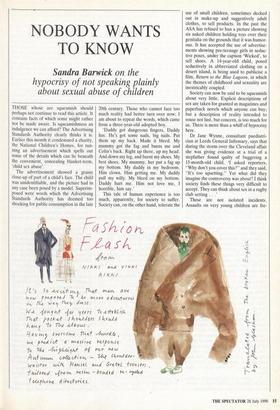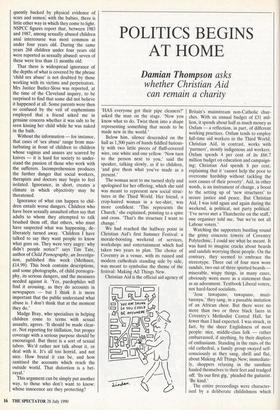NOBODY WANTS TO KNOW
Sandra Barwick on the
hypocrisy of not speaking plainly about sexual abuse of children
THOSE whose are squeamish should perhaps not continue to read this article. It contains facts of which some might rather not be made aware. Is squeamishmess an indulgence we can afford? The Advertising Standards Authority clearly thinks it is. Earlier this month it condemned a charity, the National Children's Homes, for run- ning an advertisement which spells out some of the details which can lie beneath the convenient, concealing blanket-term, 'child sex abuse'.
The advertisement showed a grainy close-up of part of a child's face. The child was unidentifiable, and the picture had in any case been posed by a model. Superim- posed were words which the Advertising Standards Authority has deemed too shocking for public consumption in the late 20th century. Those who cannot face too much reality had better turn over now: I am about to repeat the words, which came from a three-year-old adopted boy.
'Daddy got dangerous fingers, Daddy has. He's got some nails, big nails. Put them up my back. Made it bleed. My mummy got the fag and burns me and Colin's back. Right up there, up my head. And down my leg, and burnt my shoes. My best shoes. My mummy, her put a fag up my bottom. My daddy in my bedroom. Him clown. Him getting me. My daddy pull my willy. My bleed on my bottom. Daddy hurt me. Him not love me, I horrible, him say.'
This tale of human experience is too much, apparently, for society to suffer. Society can, on the other hand, tolerate the
use of small children, sometimes decked out in make-up and suggestively adult clothes, to sell products. In the past the ASA has refused to ban a picture showing six naked children holding toys over their genitalia on the grounds that it was humor- ous. It has accepted the use of advertise- ments showing pre-teenage girls in seduc- tive poses, under the caption 'Wicked', to sell shoes. A 14-year-old child, posed seductively in abbreviated clothing on a desert island, is being used to publicise a film, Return to the Blue Lagoon, in which the themes of childhood and sexuality are inextricably coupled.
Society can now be said to be squeamish about very little. Explicit descriptions of sex are taken for granted in magazines and paperback novels which anyone can buy; but a description of reality intended to rouse not lust, but concern, is too much for us. There is more than a whiff of hypocrisy here.
Dr Jane Wynne, consultant paediatri- cian at Leeds General Infirmary, says that during the storm over the Cleveland affair she was giving evidence at a trial of a stepfather found guilty of buggering a 15-month-old child. asked reporters, "Why don't you cover this?" and they said, "It's too upsetting." Yet what did they imagine the controversy was about? I think society finds these things very difficult to accept. They can think about sex in a rugby club setting . .
These are not isolated incidents. Assaults on very young children are fre- quently backed by physical evidence of scars and semen.; with the babies, there is little other way in which they come to light. NSPCC figures report that, between 1983 and 1987, among sexually abused children anal intercourse was most common at under four years old. During the same years 268 children under four years old were reported as sexually abused: seven of these were less than 11 months old.
That there is widespread ignorance of the depths of what is covered by the phrase 'child sex abuse' is not doubted by those working with its victims and perpetrators. Mrs Justice Butler-Sloss was reported, at the time of the Cleveland inquiry, to be surprised to find that some did not believe it happened at all. Some parents were then so confused by the veil of euphemisms employed that a friend asked me in genuine concern whether it was safe to be seen kissing her child while he was naked in the bath.
Without the information — for instance, that cases of 'sex abuse' range from mas- turbating in front of children to children whose vaginas and anuses are scarred by knives — it is hard for society to under- stand the passion of those who work with the sufferers. Incomprehension produces the further danger that social workers, therapists and doctors may begin to feel isolated. Ignorance, in short, creates a climate in which objectivity may be threatened.
Ignorance of what can happen to chil- dren entails worse dangers. Children who have been sexually assaulted often say that adults to whom they attempted to talk brushed them off, that others, who must have suspected what was happening, de- liberately turned away. 'Children I have talked to say they want people to know what goes on. They were very angry: why didn't people notice?' says Tim Tate, author of Child Pornography, an Investiga- tion, published this week (Methuen, £14.99). This book contains descriptions, and some photographs, of child pornogra- phy, its serious dangers, and the measures needed against it. 'Yes, paedophiles will find it arousing, as they do accounts in newspapers — but I think it is more important that the public understand what abuse is. I don't think that at the moment they do.'
Madge Bray, who specialises in helping children come to terms with sexual assaults, agrees. 'It should be made clear- er. Not reporting for titillation, but proper coverage with a serious purpose should be encouraged. But there is a sort of sexual taboo. We'd rather not talk about it, or deal with it. It's all too horrid, and not nice. How brutal it can be, and how sanitised the accounts which reach the outside world. That distortion is a bet- rayal.'
This argument can be simply put another way, to those who don't want to know: whose innocence are they protecting?



















































 Previous page
Previous page